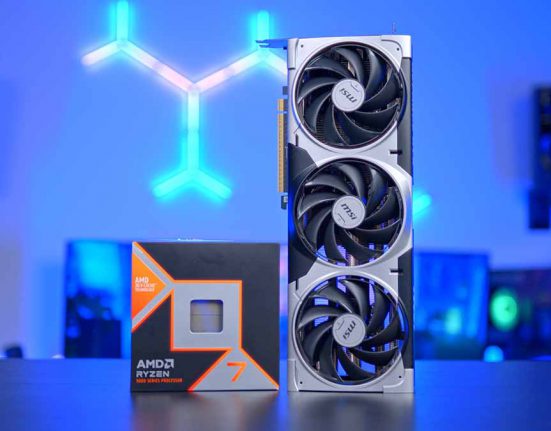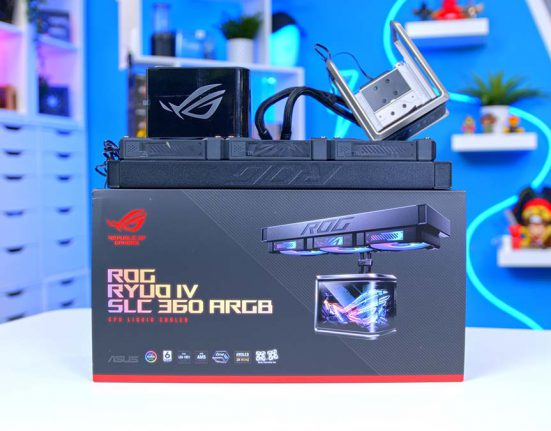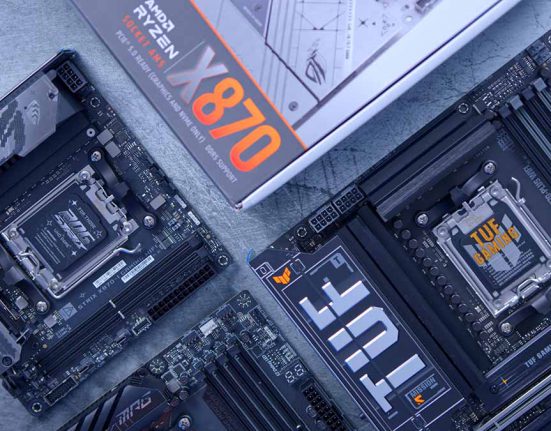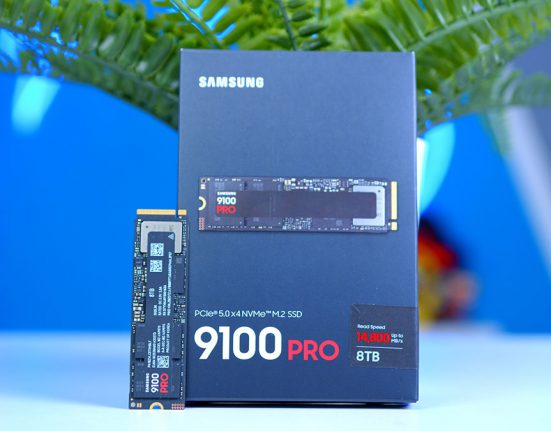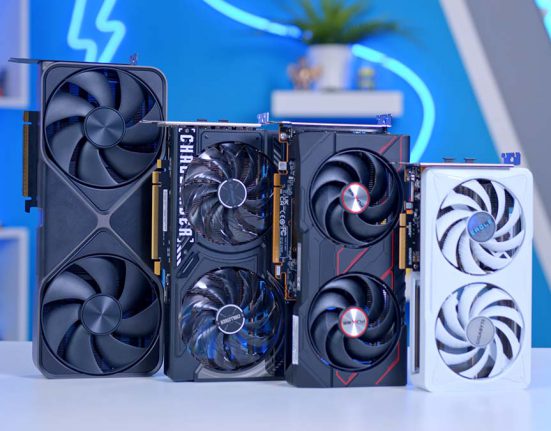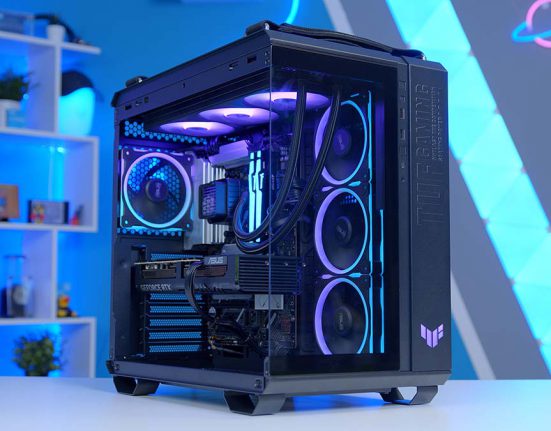Are you looking for some ideas to assemble a new PC? Do you want to join in with the 4K gaming action? Well, today we are presenting an awesome 4K-capable PC build inside one of the most unique PC cases we have ever seen. This system is set to smash through all the latest AAA titles, delivering excellent gaming performance and looking totally captivating.
We’ll be taking you through each component individually, covering all of the important specs and features and most importantly helping you piece together this awesome build.
Components
CPU: AMD Ryzen 7 9800X3D
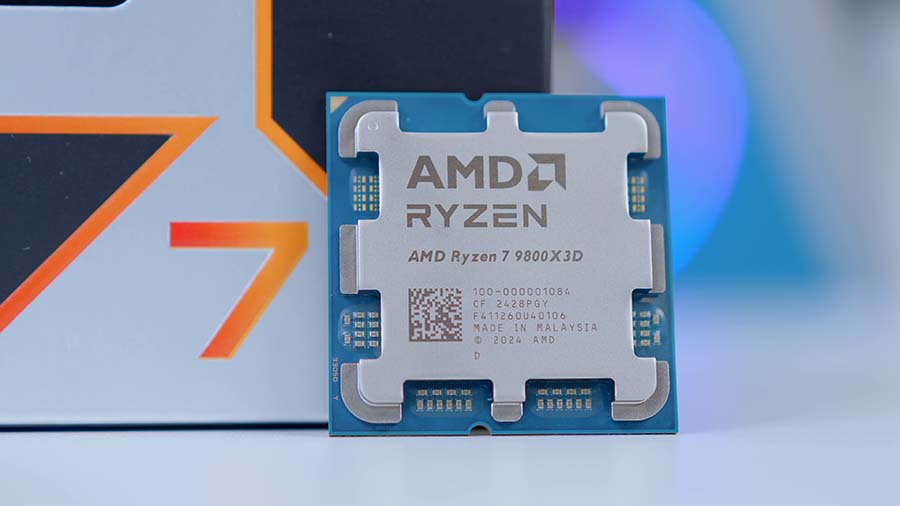
We’ve used this CPU a lot on GeekaWhat because it genuinely is a brilliant CPU. This processor is perfect for PC gaming. It has plenty of L3 cache at 96MB, which keeps the game’s instructions and data physically closer to the CPU, meaning that it has less distance to travel, leading to smoother frame rates and lowering latency. It has 8 cores and 16 threads, making it a high-performing component in single-threaded and multithreaded tasks. The Ryzen 7 9800X3D features a boosted clock speed of 5.2GHz and utilises the latest Zen5 architecture, which offers an increased number of instructions per cycle compared to the Zen 4.
| Specifications | AMD Ryzen 7 9800X3D |
|---|---|
| Core Count | 8 |
| Thread Count | 16 |
| Base Clock Speed | 4.7GHz |
| Boost Clock Speed | 5.2GHz |
| Max Cache | 96MB |
| Default TDP | 120W |
| CPU Socket | AM5 |
| Overclockable | Yes |
CPU Cooler: Thermaltake MagFloe 360 Ultra ARGB
The Thermaltake MagFloe 360 Ultra ARGB is an all-in-one (AIO) CPU cooler with a 360mm radiator. It includes a 3.95-inch square LCD screen with a 480 × 480 resolution, offering sharp visuals and extensive customisation through the TT PlayLink mobile app or TT RGB PLUS 3.0 software. Since this build will also feature an additional screen mounted inside the chassis, the cooler’s LCD might feel somewhat redundant. However, you can personalise each display to show different information, making both useful in their own way.
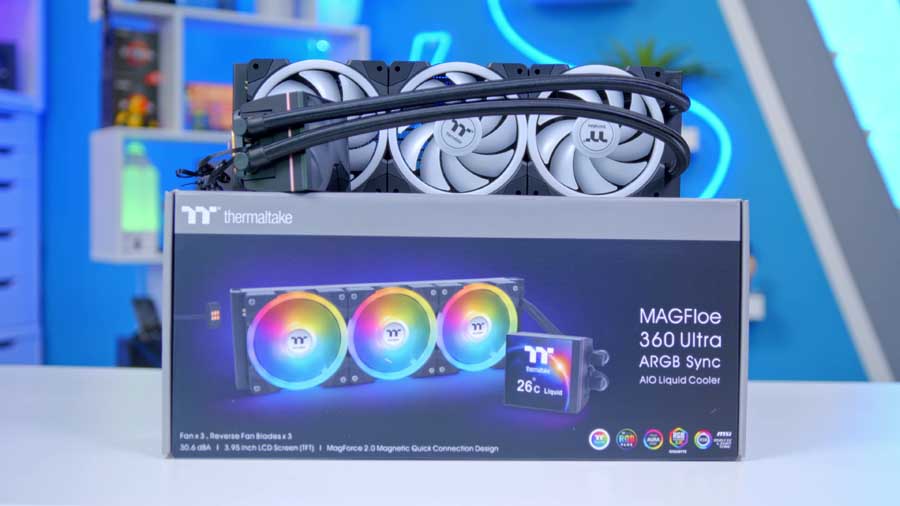
The radiator fans are not pre-installed, but they do feature a daisy-chain connection, which is a win for cable management. I can theorise that this is because reverse intake fans are bundled in with your purchase, so you’ll be able to better plan out the airflow of your PC from the get-go. Thermaltake peripherals are typically able to sync with ASUS motherboards, and with this build having exactly that, you can be confident that lighting will work seamlessly.
Motherboard: ASUS ROG STRIX X870E-E Gaming WiFi
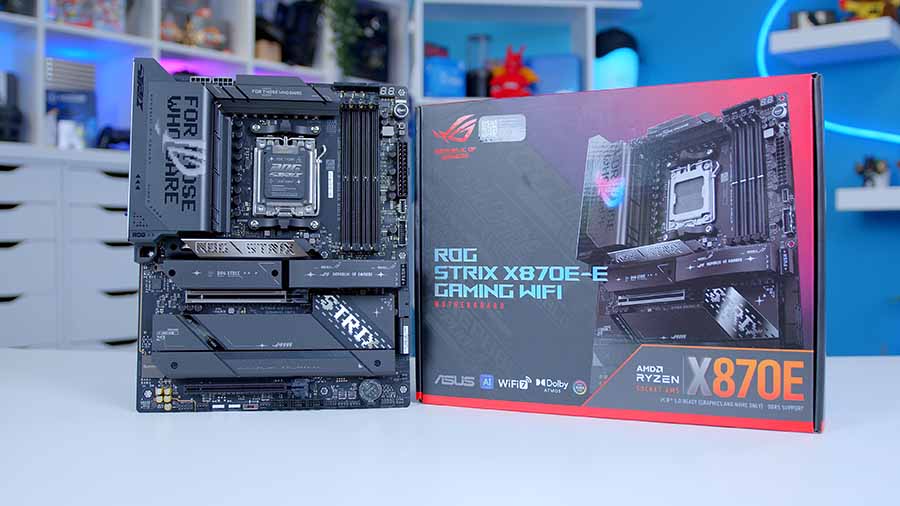
The ASUS ROG STRIX X870E-E Gaming WiFi is a stunning ATX motherboard that supports up to 192GB of DDR5 RAM, with a max speed of 8400MT/s. The ROG STRIX X870E-E Gaming WiFi has been engineered to harness the full potential of AMD Ryzen 9000 Series processors, perfect for our AMD Ryzen 7 9800X3D. For graphics, the board features a PCIe 5.0 x16 slot, ensuring full compatibility with the latest GPUs. Expansion is further supported by an additional PCIe 4.0 x16 slot (x4 mode) for add-in cards. Storage is a major highlight, with five M.2 slots: three running at PCIe 5.0 x4 speeds (one full-bandwidth, two sharing lanes with the GPU slot) and two at PCIe 4.0 x4 from the chipset. This allows for cutting-edge NVMe SSD performance and massive storage expansion. This motherboard offers high-end features, includes a generous number of front and rear OI port options, onboard Wi-Fi, and powerful VRM power phases of 18+2+2, which are necessary for strong overclocking power delivery.
| Specification | ASUS ROG Strix X870E-E Gaming WiFi |
|---|---|
| Form Factor | ATX |
| Supported Memory | 192GB DDR5 8400MT/s |
| PCI-E x16 Slots | 1 x PCI-E 5.0 1 x PCI-E 4.0 |
| PCI-E x4 Slots | 3 x PCI-E 5.0 2 x PCI-E 4.0 |
| VRM Power Phases | 18+2+2 |
| Front IO | 1 x USB 3.2 Gen2x2 Type-C 2 x USB 3.2 Gen1 Type-A 3 x USB 2.0 |
| Rear IO | 2 x USB4 Type-C 1 x USB 3.2 Gen2x2 Type-C (30W PD) 9 x USB 3.2 Gen2 Type-A 1 x USB 3.2 Gen2 Type-C |
| Audio | 1 x Optical S/PDIF 2 x Audio Jacks |
| Networking | 5 Gigabit LAN WiFi 7 |
The motherboard itself is a beautiful and artistic combination of metallic shades of black and grey, graphics and colours. It features diagonal slats, brushed aluminium, and bold RGB, hallmarks of the ROG aesthetic. But for this generation, translucent diffusers line the I/O shroud and the Q-Release array, softly contrasting the metallic heatsinks nearby. Even the reverse PCB has been considered, featuring tasteful ROG Strix branding. It’s almost a shame that the motherboard is barely visible when it’s in a chassis with all the components. In terms of physical design and quality of life features, component integration has been engineered to be mostly tool-less except for the M.2 heat shield and actual motherboard installation.
RAM: Thermaltake TOUGHRAM XG RGB D5 32GB
We’re choosing the Thermaltake TOUGHRAM XG RGB D5 32GB kit for consistent branding and lighting sync. While any 32GB DDR5 kit at around 6000MT/s will give comparable performance, timings, IC quality, and compatibility can vary between brands. We recommend DDR5-6000 since it’s the optimal balance of speed and stability for this motherboard and CPU generation.
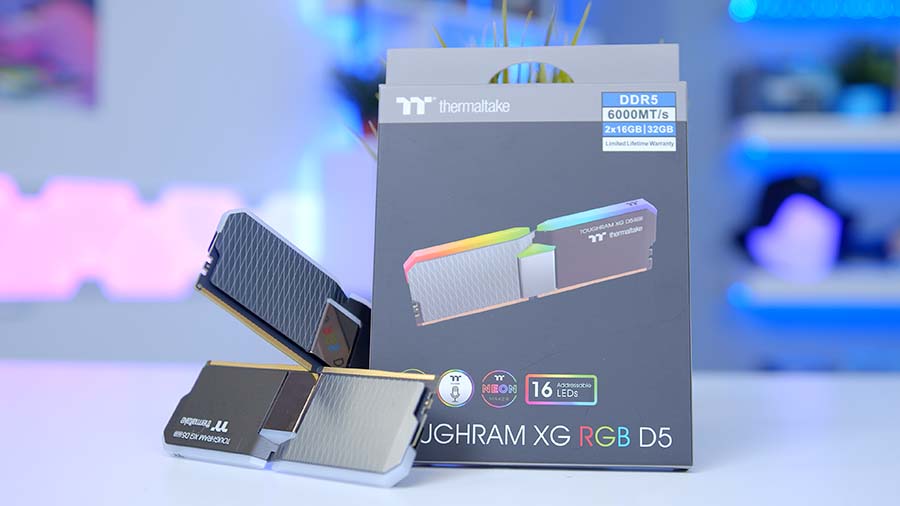
The Thermaltake TOUGHRAM XG RGB D5 boasts a unique design featuring two distinct aluminium colours, with a chrome stripe in the middle, and is built with high-quality components. Thermaltake have designed this RAM to have doubled capacity for better efficiency. With a doubled bank group architecture, the TOUGHRAM XG RGB D5 Memory DDR5 enhances access availability and brings you higher capacities without lag, leading the way to next-gen memory. The RAM also has overclocking support, a lovely feature to see, with considerations for both Intel and AMD processors using Intel XMP 3.0 and AMD EXPO, allowing you to optimise your system’s stability with simple tweaks.
SSD: Samsung 9100 Pro 2TB
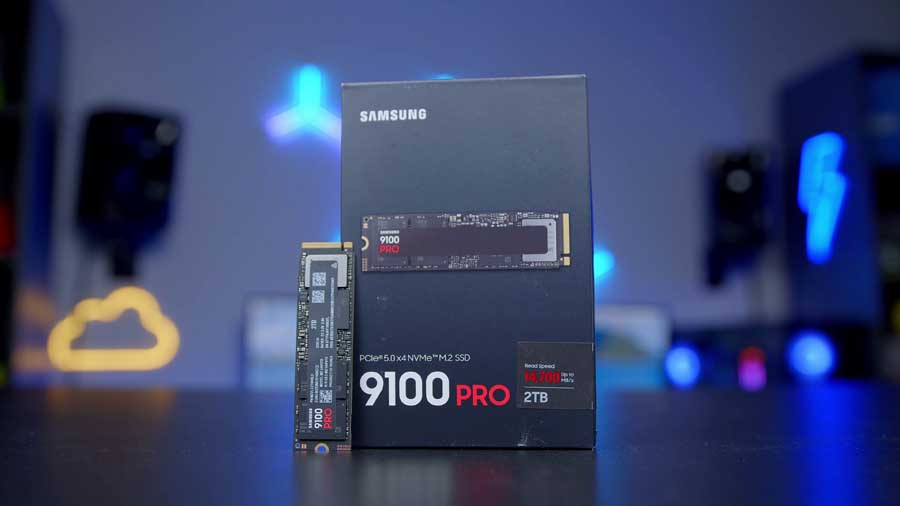
We have recently reviewed the Samsung 9100 Pro series following the release of the 8TB model. This article includes some performance statistics for this capacity SSD as well. This is one of the top-performing SSDs we’ve had, and I was impressed by its overall performance. With our in-house testing, we found that this M.2 had a sequential read and write result of 14054/13189MB/s. For gamers, this level of performance translates to faster load times, reduced download bottlenecks, and an overall smoother experience. Whether for gaming rigs or professional workloads, the 9100 Pro is the benchmark for high-end SSDs.
GPU: ASUS TUF NVIDIA RTX 5080 Gaming OC
The ASUS TUF NVIDIA RTX 5080 Gaming OC is a factory-overclocked GPU with enhanced cooling and power delivery that is fortified with rugged reinforcement for exceptional durability. The ASUS design of this NVIDIA RTX 5080 card features a triple-fan Axial-tech cooler and a strengthened metal shroud with an exhaust cutout for better airflow. It boasts incredible performance, utilising NVIDIA’s DLSS 4 technology to deliver supreme speed and superior visuals, powered by advanced AI frame generation and Tensor cores to boost FPS, reduce latency, and enhance image quality.
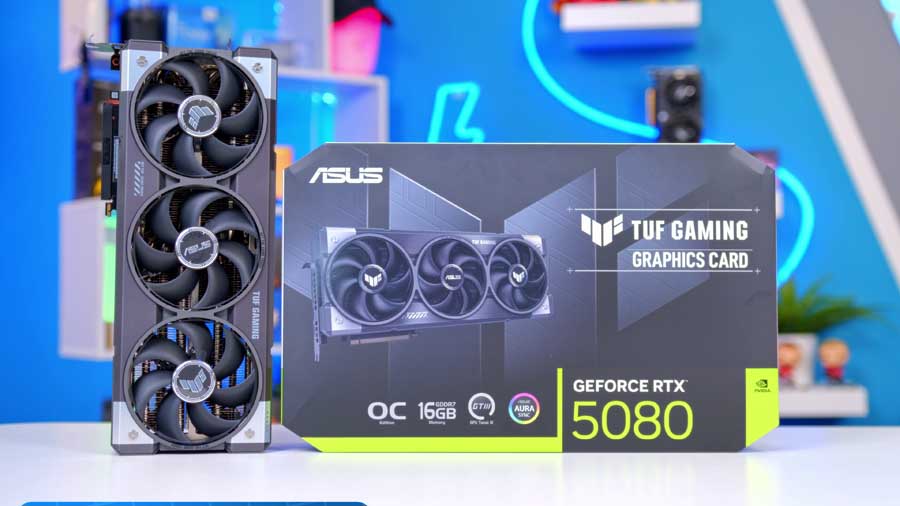
For VRAM, we always recommend at least 16GB, as games continually require more space to store shaders and textures. Don’t fall short on this, as your GPU may end up being the bottleneck of your PC soon enough. The ASUS TUF NVIDIA RTX 5080 Gaming OC features 16 GB of ultra-fast GDDR7 memory. When paired with our suggested Ryzen 7 9800X3D, you’ll effortlessly achieve 4K resolutions, giving you a future-proof setup that will handle the most demanding titles for years to come.
Case: Thermaltake View 390 Air
Thermaltake has been on the rise recently, producing some truly impressive technology. They have reimagined the standard panoramic view, taking a super cool approach where their curved tempered glass bends from the top of the chassis to the side. This, however, limits your typical radiator options, as you lose the top mounting space, forcing you to choose an alternative mounting location. These locations include the right-hand side of the inside of the chassis or mounting them on the front. On the topic of mounting options, this case allows alternative options for mounting your GPU and PCI-E expansions, with either component being able to be oriented horizontally or vertically. The case even comes with a built-in adjustable GPU support mount to stop your GPU from sagging. I really like this feature because the support mount fits in with the case internals, unlike other support options that can ruin the case’s aesthetic.
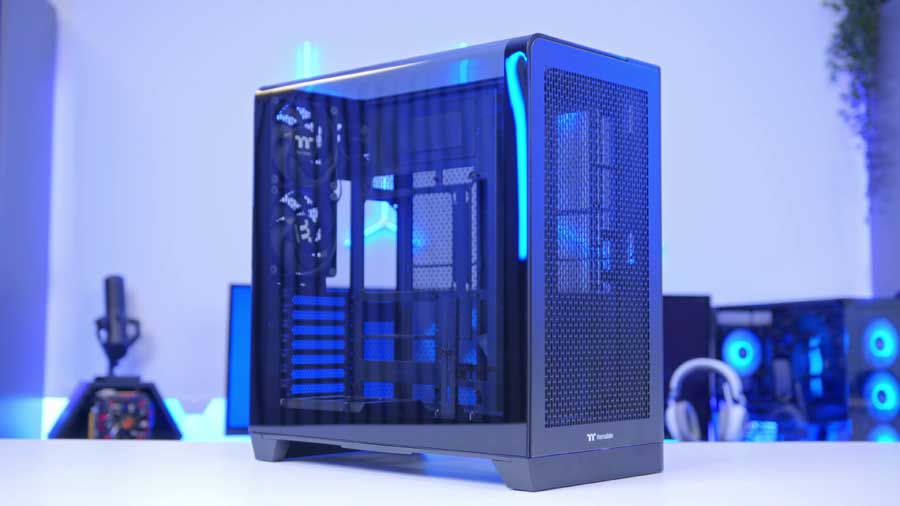
Because of the change in the way the tempered glass screen is incorporated, and thanks to the perforated front panel, the chassis has a better flow for air intake and exhaust options, helping keep the internal temperatures low at all times. We swapped out the pre-installed rear fans, which weren’t RGB capable and were a little boring, for Thermaltake TOUGHFAN EX 120 ARGB. These fans are easy to wire up due to their MagForce 2.0 Quick Connect Design, reducing the necessary cables to one. The case also offers good dust covers with easily removable filters on the right and bottom sides of the chassis, providing that extra layer of protection for your components.
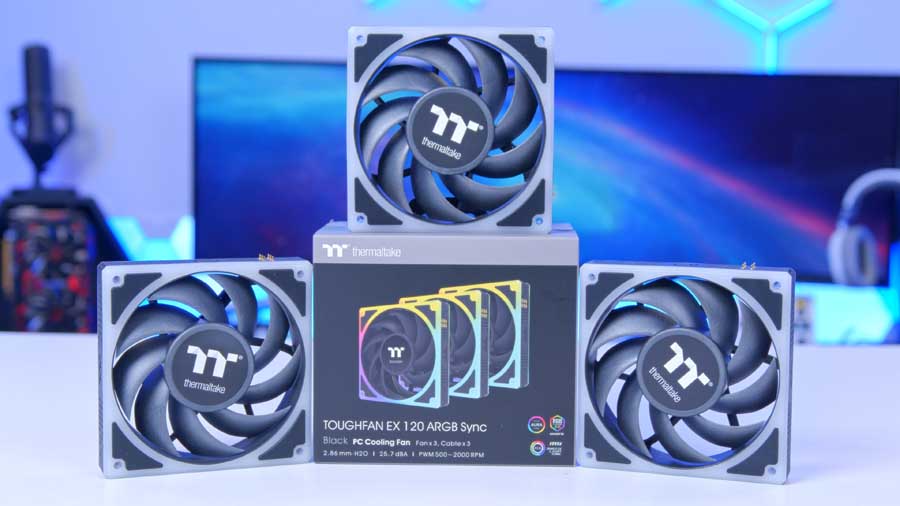
| Specification | Thermaltake View 390 Air |
| Form Factor | Mid-Tower |
| Motherboard Support | ATX, Mini ITX, Micro ATX |
| Case Dimensions (L x W x H) | 503 x 287 x 485mm (19.80 x 11.30 x 19.1inch) |
| Front IO | 1 x USB 3.2 Gen 2 Type-C 2 x USB 3.0 Type-A 1 x HD Audio |
| PCI-E Slots | 7 (rotatable and adjustable) |
| Colour | Black Snow Butter Caramel Future Dusk |
| Max Clearance | CPU Cooler Height: 160mm GPU Length: 390mm (with Radiator), 420mm (without Radiator) PSU Length: 200mm (with 2.5” SSD), 260mm (without 2.5” SSD) |
| Drive Support | Up to 3 x 2.5 inch Up to 3 x 2.5” |
| Fan Support | Top: No support. Front: 3 x 120mm Side: 3 x 120mm Bottom: 3 x 120mm Rear: 2 x 120mm PSU Shroud: No support. |
| Radiator Support | Top: No support. Front: Up to 360mm Side: Up to 360mm Bottom: No support. Rear: No support. |
| Pre-Installed Fans | Top: None. Front: None. Side: None. Bottom: None. Rear: 2 x 120mm |
This chassis includes a handy selection of IO ports: two USB 3.0 ports, one USB 3.2 Gen 2 Type-C port, a reset button, and HD audio jacks, all located on the far right of the top panel. However, their placement isn’t the most convenient – positioning the system under a desk or on the right side of a setup makes them awkward to access, which limits flexibility in how the case can be oriented. Thermaltake also offers a slightly questionable selection of colours for this case. The standard black and white are a welcome sight, but I’m puzzled by the inclusion of purple and yellow colour options.
TT RGB Plus LCD Screen Kit Upgrade
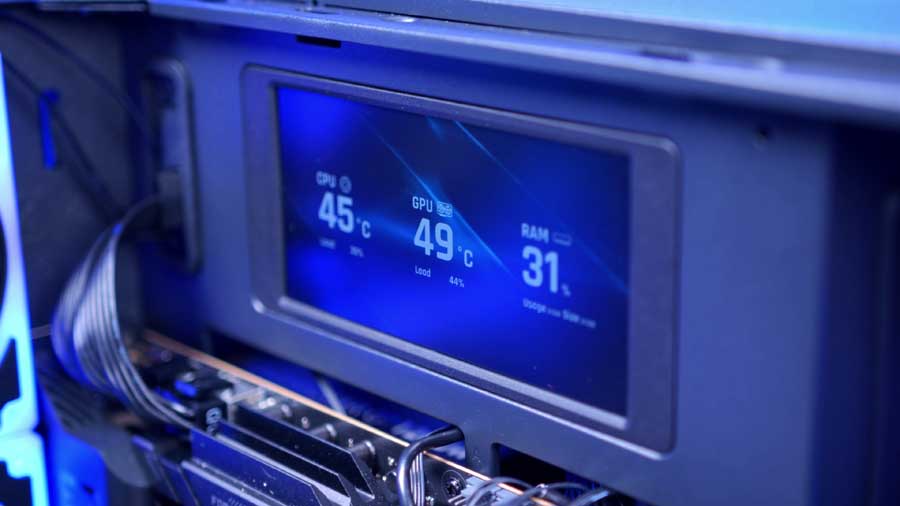
On the inside of the chassis, there is a panel that you can unscrew, which has been designed to integrate this TT RGB Plus 6-inch LCD screen. The screen can present real-time information and play JPG and GIF files at a 1480 x 720 resolution. Additionally, the display can show time and weather information, enhancing both visual appeal and customisation options for your build. I really love this innovative implementation, and with the vertically panoramic glass, it will be even easier to view this screen. This is an imposing, clearly well-thought-out case overall.
PSU: Thermaltake Toughpower GT 1200W
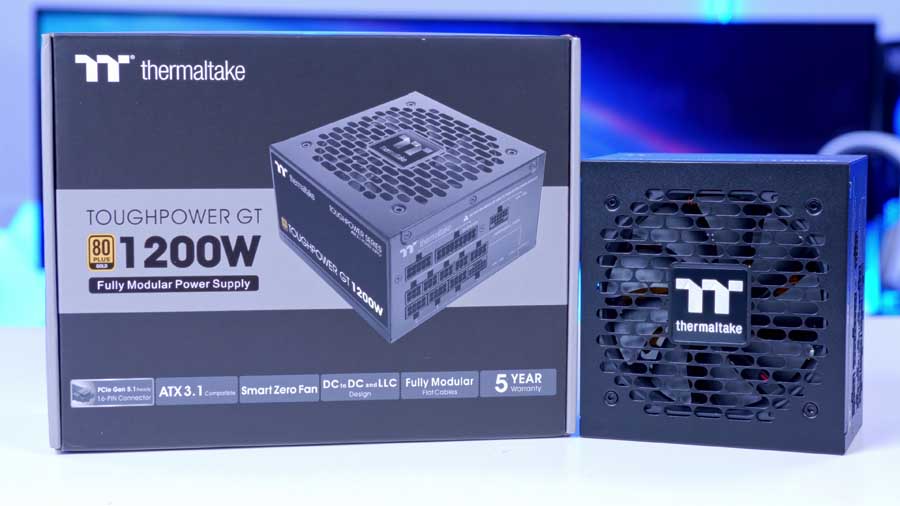
Again, keeping the Thermaltake theme consistent, we have opted for this Toughpower GT that provides 1200W of power to the components. This PSU is ATX 3.1 ready and PCIe 5.1 ready, which is necessary these days for feeding the latest components. An interesting feature of this PSU is its two GPU ports. It includes two native 12V-2×6 (PCIe 5.1) connectors, each capable of delivering up to 600W, making it ideal for dual GPU or future flagship cards. If you’re building a PC for content creation, this option is great because it has the capacity to power a second GPU if needed.
Our graphics card, the ASUS TUF NVIDIA RTX 5080 Gaming OC, has a recommended power supply of 850W, and we want to make sure we are leaving enough room for possible upgrades in the future. You’re better off forking out a little bit extra now for a slightly more powerful PSU than needed than having to pay out for a completely brand new PSU in the future.
Gallery
![PI_[DM71] Awesome 4K capable PC build 2025 - GALLERY](http://geekawhat.com/wp-content/uploads/2025/09/PI_DM71-Awesome-4K-capable-PC-build-2025-GALLERY-4.jpg)
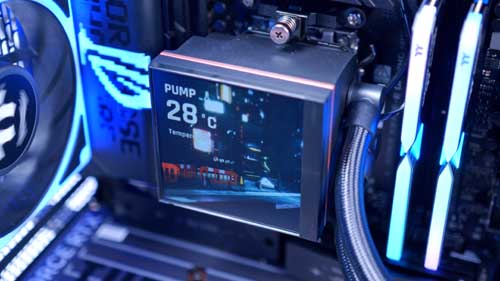
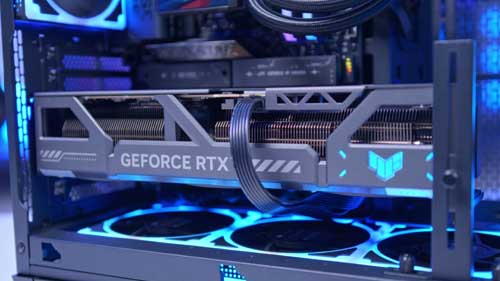
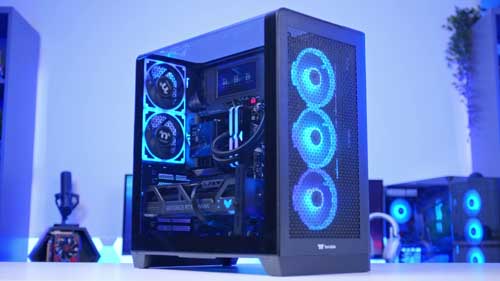
![PI_[DM71] Awesome 4K capable PC build 2025 - GALLERY](https://geekawhat.com/wp-content/uploads/2025/09/PI_DM71-Awesome-4K-capable-PC-build-2025-GALLERY-4.jpg)
Performance
This PC produces some brilliant gaming statistics. At 4K, we are constantly seeing over 60 frames per second, especially in the first-person shooter games like Apex Legends, with some even hitting triple digits. 60 FPS is an acceptable amount of frames for smooth gameplay, being the standard target for most consoles.
| Game Title | Average FPS | 1% Lows | 0.1% Lows |
| F1 25 | 175 | 115 | 54 |
| Cyberpunk 2077 | 94 | 59 | 23 |
| COD: Black Ops 6 | 107 | 45 | 27 |
| Marvel Rivals | 96 | 51 | 27 |
| Apex Legends | 289 | 173 | 86 |
| Doom: The Dark Ages | 62 | 42 | 23 |
| Fortnite (1080p) | 451 | 199 | 104 |
F1 25, being the newest title that we’ve tested, pulled in a whopping 175 frames per second with this setup; this level of frames is usually desirable and ideal for esports; even with its 1% lows of 115 FPS and 0.1% lows of 54 FPS, the smoothness of the gameplay is impressive for a recently released title.
The only games where we see the frames struggling a little are Cyberpunk 2077 and Doom: The Dark Ages. We conduct all our benchmark testing without utilising the extra features. Therefore, if you have enabled DLSS 4 for the NVIDIA RTX 5080, these numbers likely stay above 100 FPS. This rig is more than just 4K capable; it’s a 4K beast and will comfortably carry all your gaming needs through the upcoming years of triple-A games.


![FI_[DM71] Thermaltake View 390 Air + TUF 5080 - GeekaWhat FI_[DM71] Thermaltake View 390 Air + TUF 5080](https://geekawhat.com/wp-content/uploads/2025/09/FI_DM71.jpg)
